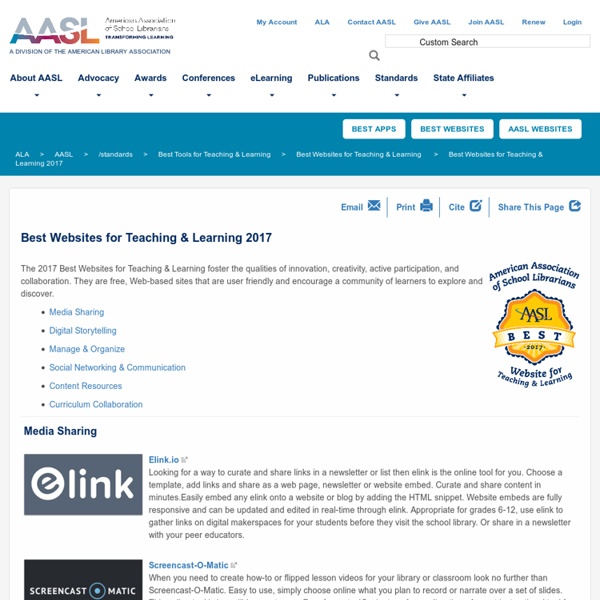



http://www.ala.org/aasl/standards/best/websites/2017
Related: gliblib • Miscellaneous • Digital TeachingUseful WebQuest Resources Site menu: Latest news: June 17, 2015: This year marks the 20th anniversary of the WebQuest model. Watch this space for announcements of some new resources coming later this summer! October 22, 2008:WebQuests and Web 2.0? This webinar conducted by the Discovery Education Network features a discussion about how blogs and wikis fit into the WebQuest model. How To Make an App With No Programming Experience (Updated Guide) by Chris Ching Today I’m going to show you how to make an app even if you don’t have any coding experience. Introduction The Pacific Northwest Tree Octopus How You Can Help Here are a few things that you can do to help save the Pacific Northwest tree octopus: Posters motivate the citizenry to action! Best Websites for Teaching & Learning The Landmark Websites are honored due to their exemplary histories of authoritative, dynamic content and curricular relevance. They are free, web-based sites that are user friendly and encourage a community of learners to explore and discover and provide a foundation to support 21st-century teaching and learning. Guidelines for School Library Programs: Instructional Partner "The SLMS collaborates with classroom teachers to develop assignments that are matched to academic standards and include critical thinking skills, technology and information literacy skills, and core social skills and cultural competencies. The SLMS guides instructional design by working with the classroom teacher to establish learning objectives and goals, and by implementing assessment strategies before, during, and after assigned units of study." Content Resources, Lesson Plans, and More
Smart Strategies for Student Success Even students who’ve had years of active involvement in learning activities don’t automatically use strategies that best foster learning. However, working smarter through the use of specific success strategies can have a profound influence on learning outcomes. In this article, we share practical strategies teachers can use with students to help them learn smarter and with greater independence. Explain It to Your Brain One creative way for teachers to help to get students engaged in the process of developing effective learning strategies is to apply a metaphor we call “explain it to your brain.” Students who use self-explanation tell themselves what they are thinking and doing when learning.
Beautiful, Decorative, and Sometimes Crude: Illuminated Manuscripts and Marginalia Illuminated manuscripts are manuscripts that are covered with painted ornaments presented under several forms. These documents are perhaps most commonly associated with the European Middle Ages. Nevertheless, the concept of, and the techniques used for, the production of the illuminations were introduced at a much earlier period of time.
Best Apps for Teaching & Learning 2017 Touchcast Studio by Touchcast Level: Middle School + Platform: iOS Website Touchcast is truly “a TV studio in your hands.” Curation Situations: Let us count the ways Curation is a funny word. When my colleagues and I wrote our Social Media Curation Library Technology Report for ALA, we struggled with a definition. The folks we interviewed across library land curated in several different ways and we used the term curation differently depending on current community needs or where they were in any particular project.
A Handy Visual Featuring The 7 Learning Styles September 10, 2014 During the first month of the new school year, teachers get to know their students in terms of their learning levels, where they are at with their learning, their strengths and weaknesses, and, most importantly, their learning styles. I emphasized the last point because it is the key to a successful learning journey for students. When teachers identify the plurality of the learning styles in their classes they become in a better position to cultivate a learning environment where every student have their share in the learning taking place in class. One of the most popular theories that inform pedagogy in this regard is Howard Gardner's multiple intelligences theory. This theory posits the existence of seven different areas of intelligence that characterize the learning style one is more comfortable with. The visual below provides a very great overview of these 7 learning styles.
100 Amazing How-To Sites to Teach Yourself Anything Posted by Site Administrator in Online Learning May 7th, 2009 Learning new skills and expanding your knowledge doesn’t have to cost you an arm and a leg. There are loads of free resources on the Web that can help you find instructional videos, tutorials and classes to learn a wide variety of skills from fixing basic car problems to speaking another language. Coding for Kindergarteners Last year at this time, I was trying not to think about kindergarteners. I was still teaching ninth grade English and had just accepted a job teaching technology to K-5. I was excited about the challenge, and I knew that I'd bitten off more than I could chew. Developing the tech curriculum challenged me to teach programming or at least computational thinking at each elementary grade level. Our school is mid-pivot in technology -- we're in our second year of a middle school 1:2 iPad program, our first year of having a cart of iPads available for elementary, and our last year of two PC labs for the students to use (next year we'll have only one lab).